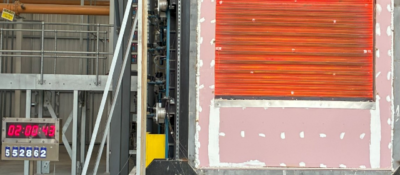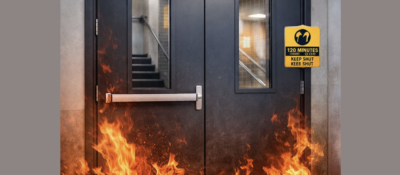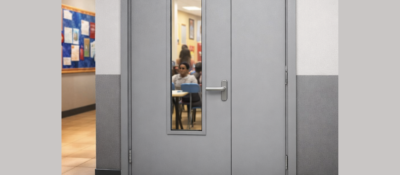Roller shutters are built to last. But, like any mechanical system, they can sometimes develop faults.
Whether your shutter is sticking, making noise, or refusing to open, some issues can be fixed without calling in a professional.
In this guide, we’ll walk you through common roller shutter problems and simple DIY fixes to help you get things working again quickly and safely.
The best place to start is assessing the situation and identifying the underlying issues with your roller shutter. A thorough evaluation will guide our repair process and help us avoid unnecessary work or further damage.
The first step is to observe the symptoms your roller shutter exhibits. Is it stuck and refusing to move? Perhaps it's making unusual noises during operation, or you've noticed visible damage to the slats or panels. Here's a simple table to help us pinpoint common problems:
| Symptom | Potential Issue |
|---|---|
| Shutter doesn't move | Obstruction or motor failure |
| Grinding or squeaking noise | Lack of lubrication or debris |
| Uneven movement | Misaligned tracks or damaged slats |
| Visible dents or damage | Impact damage or wear and tear |
For a more in-depth analysis, refer to our roller shutters troubleshooting guide. It provides a comprehensive look at various problems and their possible causes.
Safety is paramount when undertaking any repair work, especially with something as large and potentially dangerous as roller shutters. Here are some precautions we must take:
By following these safety steps, we can mitigate the risks involved in roller shutter repairs and protect ourselves from harm. If at any point the task seems beyond our capabilities or if the issue is too complex, it's wise to consult professional roller shutters repair services. Remember, it's always better to be safe than sorry. Now, let's move on to the tools we'll need, detailed in the roller shutters repair guide.
Having the right tools is essential for a successful roller shutter repair project. Let’s look at the necessary equipment you’ll need to tackle basic repairs, and also suggest some optional tools for those more advanced issues.
| Tool | Purpose |
|---|---|
| Screwdrivers | Removing and fastening screws |
| Adjustable wrench | Loosening and tightening bolts |
| Socket set | Working with nuts of various sizes |
| Pliers | Gripping and bending metal parts |
| Hammer | Adjusting and fitting components |
| Tape measure | Measuring replacement parts |
| Spirit level | Ensuring shutters are level |
For those who are facing more complex issues or have experience in roller shutter repairs, the following tools can be extremely helpful:
These tools will allow you to address a wide range of problems, from electrical faults to replacing entire slats or panels. For example, a soldering iron may be necessary for repairing any damaged wiring, whereas a multimeter is crucial for diagnosing electrical issues.
| Tool | Purpose |
|---|---|
| Drill and drill bits | Creating holes for bolts or rivets |
| Rivet gun | Fastening parts together securely |
| Soldering iron | Repairing electrical connections |
| Multimeter | Testing electrical circuits |
| Wire cutters and strippers | Preparing wires for electrical work |
| Silicone spray or lubricant | Ensuring smooth operation of moving parts |
Armed with the right tools and a bit of know-how, we can tackle roller shutters repairs confidently. However, if the problem seems beyond our expertise, it's wise to call in the professionals. Our article on roller shutters repair services can help you find reliable assistance.
There are a few common issues that we often encounter with roller shutters. You are most likely having one of the following issues, so we’ve outlined the solution for each.
Stuck or jammed roller shutters can be a significant inconvenience and might compromise your security. This problem can arise due to various reasons such as debris in the tracks, lack of lubrication, or a malfunction in the shutter's mechanism. Before attempting any repairs, it's important to disconnect any power supply to avoid accidents.
Here's a basic checklist for troubleshooting stuck or jammed roller shutters:
| Issue | Possible Cause | Solution |
|---|---|---|
| Shutter won't move | Obstruction in tracks | Clear debris and inspect tracks for damage |
| Shutter is stiff | Lack of lubrication | Apply appropriate lubricant to moving parts |
| Shutter partially opens | Misaligned tracks | Align tracks and ensure they are securely fastened |
Noisy roller shutters can be a sign that something isn't quite right. The noise could be due to loose components, worn-out parts, or a need for lubrication. Regular maintenance can often prevent these issues from developing.
| Noise Type | Likely Cause | Solution |
|---|---|---|
| Squeaking | Dry bearings or hinges | Apply lubricant to affected areas |
| Rattling | Loose bolts or panels | Tighten all connections |
| Grinding | Worn components | Replace worn parts |
Damaged slats or panels not only look unsightly but can also affect the integrity of your roller shutters. Damage can occur due to wear and tear, accidental impact, or attempted break-ins. Depending on the severity, slats or panels may need to be straightened or replaced.
| Damage Type | Assessment | Action |
|---|---|---|
| Minor dent | Slats retain structural integrity | Attempt to straighten using appropriate tools |
| Major bend | Slats are compromised | Replace with new slats or panels |
| Surface scratches | Cosmetic damage | Touch up with paint or protective coating |
For a step-by-step process on how to repair or replace damaged components, we have a roller shutters repair guide available. You can also check out our guide on roller shutter troubleshooting and roller shutter maintenance.
Addressing these common issues can extend the life of your roller shutters and ensure they remain functional. However, if the problem persists or you are unsure about performing any repairs, it may be time to call in the experts. Visit our roller shutters repair services page to find a reputable professional who can help.
Repairing roller shutters can be a manageable task if approached methodically. We'll walk you through the steps to take when your roller shutters are in need of a fix. Remember, if at any point the task seems overwhelming, don't hesitate to consult our comprehensive roller shutters repair guide or contact professional roller shutters repair services.
Firstly, ensure that the shutter is in the down position, if possible, to relieve tension on the system. Disconnect the shutter from the power source if it's electric. You'll want to carefully remove the shutter casing or pelmet to expose the roller mechanism.
| Task | Tool Needed |
|---|---|
| Disconnect power | Insulated pliers |
| Remove casing | Screwdriver or drill |
Once the shutter is exposed, we'll thoroughly inspect all components for visible signs of wear or damage. Pay special attention to the slats, springs, and guides.
| Component | Common Issue |
|---|---|
| Slats | Bends or breaks |
| Springs | Loss of tension |
| Guides | Obstruction or damage |
After identifying the issue, we'll proceed with the appropriate repairs. This could involve straightening bent slats, lubricating moving parts, or replacing damaged components. Always use the right tools for the job to ensure safety and efficiency.
| Repair Task | Tool Needed |
|---|---|
| Straightening slats | Mallet |
| Lubricating parts | Silicone spray |
| Replacing components | Various, as needed |
Once repairs are completed, it's crucial to conduct a thorough test of the roller shutter's functionality. Gently guide the shutter up and down a few times to ensure smooth operation. For ongoing care, refer to our roller shutters maintenance tips to keep your shutters in top condition and prevent future issues.
After conducting repairs on roller shutters, it's crucial to ensure that everything is functioning correctly. Proper testing and regular maintenance are key to prolonging the life of the shutters and preventing future issues.
Once we've completed the repairs, we need to test the roller shutters thoroughly to confirm that they operate smoothly. Here's a checklist we can use during the testing phase:
Regular maintenance of roller shutters is essential to avoid costly repairs down the line. Here are some maintenance tips we can follow:
While we can handle many roller shutters repairs ourselves, there are times when it's best to call in a professional. Recognising these signs can save us time and ensure the safety and security of our property.
There are several indicators that suggest we should seek professional help with our roller shutters:
Safety Risks: If at any point we feel that continuing with the repair could pose a risk to our safety, we should stop and seek professional assistance.
Make sure you find a trustworthy roller shutter repair service. Check credentials, read reviews, request quotes and ask about warranties. By following these steps, we can select a professional roller shutter repair service that will handle our needs effectively and ensure the longevity and reliability of our security measures.
If our roller shutters require attention beyond routine roller shutters maintenance or simple roller shutters troubleshooting, don't hesitate to consult the experts listed on our roller shutters repair services page.

Installing a fire shutter over a servery hatch? Learn why floor-level testing may not cover countert...

Security Direct was appointed to supply and install a series of FD120 steel fire doors with integrat...

Steel fire doors provide critical fire protection in commercial and industrial buildings. Learn the ...